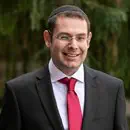Prime Minister Binyamin Netanyahu addressed the 75th annual United Nations General Assembly Tuesday. The address was delivered via video due to the coronavirus pandemic.
Netanyahu began by referencing the Abraham Accords, the peace agreement signed between Israel and the Gulf states of Bahrain and the United Arab Emirates.
"The Middle East is not exactly renowned for producing good news, and few expected this year to be any different. The pandemic virus is ravaging our part of the world like everywhere else. But I am pleased to report to you that this year, I can tell you about good news from the Middle East. In fact, I can report two pieces of good news," Netanyahu said.
"Earlier this month, at a White House ceremony hosted by President Trump, Israel signed historic agreements with the United Arab Emirates and the kingdom of Bahrain. This was the first peace treaty between Israel and an Arab country in over a quarter of a century, and it was the first time peace agreements between Israel and two Arab countries were signed on the same day. These new agreements will bring our peoples the blessings of peace," he added.
"I also have no doubt that more Arab and Muslim countries will be joining the circle of peace soon," Netanyahu declared.
He further stated that the recent peace accords "came about because of a clear break with the failed strategies of the past."
"For far too long, the Palestinians effectively wielded a veto on peace between Israel and the broader Arab world. For decades, all progress was halted and was held hostage to completely unrealistic Palestinian demands, such as the demand that Israel withdraw to the indefensible lines of 1967 and place its security in the hands of others; or the demand that Israel expel tens of thousands of Jews from their homes, effectively committing ethnic cleansing; or the demand that Israel absorb millions of Palestinians who are descendants of refugees from a war that was launched by the Palestinians against Israel more than half a century ago," he said.
Netanyahu thanked President Trump for changing the paradigm for peace talks in the Middle East and for choosing "a path anchored in reality."
During his speech, Netanyahu noted the danger posed by Iran and its proxies, including the Hezbollah terrorist organization in Lebanon. Recalling the massive explosion which rocked the Beirut port last month, Netanyahu warned that a similar explosion could occur in the neighborhood of Janah near the Beirut airport because Hezbollah is storing missiles there.
"It’s right next to the international airport," he said. "And here, Hezbollah is keeping a secret arms depot. This secret arms depot, right here, is adjacent, a meter away, from a gas company. These are gas canisters. Right here. It’s a few meters away from a gas station. It’s fifty meters away from the gas company. Here are more gas trucks. And it’s embedded in civilian housing here, civilian housing here. For the Janah neighborhood residents this is the actual coordinates."
"I want to show you the entrance to Hezbollah's missile factory," he pointed out, showing the location of Janah on a map pf Beirut. "Because that’s what it is. It’s right here. This is the gas company, and this is the missile explosive depot."
"I say to the people of Janah, you’ve got to act now. You’ve got to protest this. Because if this thing explodes, it’s another tragedy.
"I say to the people of Lebanon, Israel means you no harm.
"But Iran does. Iran and Hezbollah have deliberately put you and your families in grave danger. And what you should make clear is that what they have done is unacceptable. You should tell them, tear these depots down."
Netanyahu called on the international community to act to prevent Hezbollah from "using Lebanon and Lebanese civilians as human shields."
He also called on the international community to "stand up to" Hezbollah's patron, Iran.
"There is no question that Iran is seeking nuclear weapons. The once secret nuclear archive Israel’s agents obtained from the heart of Tehran, proves that beyond a shadow of a doubt.
"In the run-up to the nuclear deal, Israel was told—especially by our European friends—that any Iranian violation would be met with a quick and severe response.
"But in the face of Iran’s brazen violations, in the face of the irrefutable evidence of the nuclear archive, the Security Council has done, well, absolutely nothing.
"And wedded to the failed nuclear deal, the Security Council also still refuses to see what was obvious to anyone who understands anything about the Middle East.
"Rather than curb Iran’s aggression, the nuclear deal fed and funded it," he declared.
"Last month, when the Security Council refused to extend an arms embargo on Iran, the United States snapped back the sanctions," he recalled.
"While the Security Council is divided, we in the region are united. Both Arabs and Israelis are together urging tough action on Iran. And when Arabs and Israelis agree, others should pay attention."
"Israel calls upon all members of the Security Council, stand with the United States against Iran's aggression, stand with it in insisting that Iran end its nuclear weapons program once and for all, stand with the United States in confronting the greatest danger to peace in our region," Netanyahu said.

